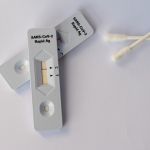No more never-ending queues where you have to wait to get tested: from now on, with the self-test kits, you can find out if you are positive to Covid-19 without leaving your home. These self-test kits are targeting at asymptomatic people over 15 years of age, and are available on sale in pharmacies starting Monday April 12, 2021.
The test is expected to be less invasive: the swab is to be sunk 3 to 4cm up one’s nostril. The result is delivered in under 20 minutes, after dipping the swab in the reagent product.



 Covid: nasal self-test kit, how to use it properly? Recommendations
Covid: nasal self-test kit, how to use it properly? Recommendations
They are likely to be fought over in the coming days. Self-test kits are available in pharmacies starting this April 12, 2021 in France. Thanks to a swab put in one’s nose, this system enables a simple and quick self-test. But then, how to use it properly? The Health Minister has issued recommendations. [Read more]
The ideal solution to curb the spread of the virus, and isolate contaminated people sooner? Not so quite…
If the test is positive, you have to go to a pharmacy or a healthcare facility to take a PCR test that will confirm the result or not. And if the test is negative, perhaps it has been badly performed.
Our peers from 20 Minutes asked a healthcare professional what he thought about these self-test kits. According to Doctor Jérôme Marty, head of the UFML (the French Union Trade for Independent Medicine – or Syndicat de l’Union française pour une médecine libre), these new tools are a major breakthrough in the fight against the virus. “They can be used ahead of a family lunch, at the movie theater or at the office. These would be a tool to protect the group. In the event of positive result, the person will have to self-isolate and the fire will be put out very soon”, the doctor hopes.
Moreover, these easily purchasable tests will make testing for the virus easier in populations that are not tested enough at the moment, “such as people living in urban areas, or in some suburbs, and who do not have access to a testing center”, Dr. Marty goes on. This new defense system could be useful “for several months, while the population is massively being vaccinated”.
Self-test kits can also be massively distributed in schools to stop at-school infection.
Yet, these new tools cannot persuade everyone. Olivier Véran himself even admitted that using these kits was harder than it seems. Many health professionals fear a boom in false negatives. Reassured by the (inaccurate) result of their tests, citizens could therefore be less cautious and could spread the virus even more.
Moreover, the Haute Autorité de Santé condemns results less reliable than PCR and antigenic tests when it comes to nasopharyngeal swabs. Self-test sensitivity is set around 80 to 95% in symptomatic patients, and 50 to 60% in asymptomatic people.
Another concerning issue is that will people who tested positive to Covid-19 when taking a self-test warn their families and everyone, they have been around, they are positive? Without the control pattern set up by the health insurance (the Assurance Maladie in France) when it comes to “official tests”, it could be harder to stop the contamination chain.
Well, despite all advantages highlighted, it is possible people give self-test kits the cold shoulder. As a matter of fact, the latter are charged: prices are limited to €6 so far, and expected to move down to €5.20 from mid-May. Yet, it is not sure that private individuals are willing to pay when tests in pharmacies are free of charge.